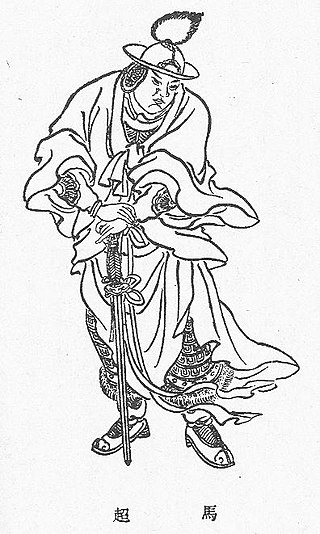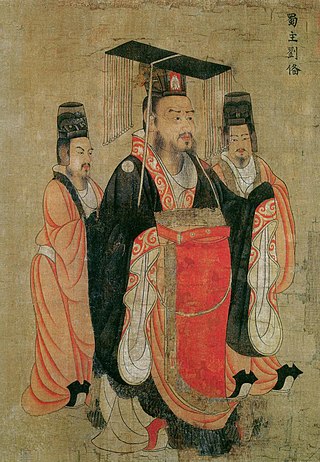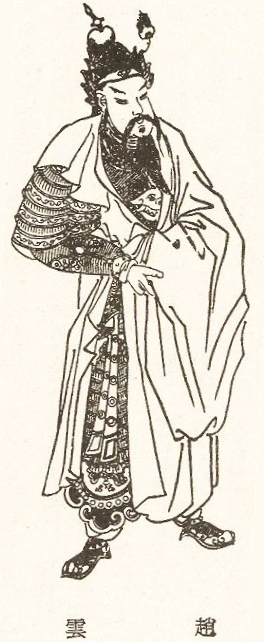Related Research Articles

Ma Chao (176–222),courtesy name Mengqi,was a Chinese military general and warlord who lived in the late Eastern Han dynasty and early Three Kingdoms period of China. A descendant of the general Ma Yuan,Ma Chao was the eldest son of Ma Teng,a prominent warlord in Liang Province. In 211,he formed a coalition with Han Sui and other northwestern warlords and revolted against the Han central government,which was led by the warlord Cao Cao. The coalition broke up after losing the Battle of Tong Pass against Cao Cao's forces. Ma Chao initially retreated,but later returned to attack and seize control of Liang Province by killing the provincial inspector Wei Kang and forcing Wei Kang's subordinates to submit to him. About a year after Ma Chao started his uprising,Emperor Xian issued an imperial decree ordering the execution of Ma Chao's family members,who were in Ye city at the time. In the meantime,Wei Kang's subordinates,led by Zhao Ang,Yang Fu and others,rebelled against Ma Chao and forced him out of Liang Province. Ma Chao retreated to Hanzhong Commandery,where he borrowed troops from the warlord Zhang Lu,and returned to attack Liang Province but was ultimately defeated and driven back. Ma Chao took shelter under Zhang Lu for a while until around 214,when he heard that the warlord Liu Bei was fighting for control over Yi Province with Yi Province's governor,Liu Zhang. He defected to Liu Bei's side and assisted Liu Bei in capturing Yi Province from Liu Zhang. Ma Chao had served as a general under Liu Bei since then and participated in the Hanzhong Campaign in 219. He died in 222.

Liu Bei,courtesy name Xuande (玄德),was a Chinese warlord in the late Eastern Han dynasty who later became the founding emperor of Shu Han,one of the Three Kingdoms of China. Although he was a distant relative of the Han imperial family,Liu Bei's father died when he was a child and left his family impoverished. To help his mother,he sold shoes and straw mats. When he reached the age of fifteen,his mother sent him to study under Lu Zhi. In his youth,Liu Bei was known as ambitious and charismatic. He gathered a militia army to fight the Yellow Turbans. Liu Bei fought bravely in many battles and grew famous for his exploits. Later,he participated in the coalition against Dong Zhuo,following this joined his childhood friend Gongsun Zan and fought under him against Yuan Shao.

Zhao Yun,courtesy name Zilong (子龍),was a military general who lived during the late Eastern Han dynasty and early Three Kingdoms period of China. Originally a subordinate of the northern warlord Gongsun Zan,Zhao Yun later came to serve another warlord,Liu Bei,and had since accompanied him on most of his military exploits,from the Battle of Changban (208) to the Hanzhong Campaign (217–219). He continued serving in the state of Shu Han –founded by Liu Bei in 221 –in the Three Kingdoms period and participated in the first of the Northern Expeditions until his death in 229. While many facts about Zhao Yun's life remain unclear due to limited information in historical sources,some aspects and activities in his life have been dramatised or exaggerated in folklore and fiction. In the 14th-century historical novel Romance of the Three Kingdoms,he was lauded as a member of the Five Tiger Generals under Liu Bei.

Zhang He,courtesy name Junyi,was a military general serving under the warlord Cao Cao in the late Eastern Han dynasty of China. He continued serving in the state of Cao Wei under its first two rulers,Cao Pi and Cao Rui,during the Three Kingdoms period until his death.

Xiahou Yuan,courtesy name Miaocai,was a Chinese military general and politician serving under the warlord Cao Cao in the late Eastern Han dynasty of China. He is known for his exploits in western China in the 210s,during which he defeated Cao Cao's rivals Ma Chao and Han Sui in Liang Province and the surrounding areas,and forced several Di and Qiang tribal peoples into submission. He was killed in action at the Battle of Mount Dingjun while defending Hanzhong Commandery from attacks by a rival warlord Liu Bei. Xiahou Yuan's death was highly dramatised in the 14th-century historical novel Romance of the Three Kingdoms,in which he was slain by Liu Bei's general Huang Zhong during a surprise raid.

Yuan Shao,courtesy name Benchu (本初),was a Chinese military general,politician,and warlord who lived in the late Eastern Han dynasty. He occupied the northern territories of China during the civil wars that occurred towards the end of the Han dynasty. He was also an elder half-brother of Yuan Shu,a warlord who controlled the Huai River region,though the two were not on good terms with each other.

Guo Jia,courtesy name Fengxiao,was an adviser to the warlord Cao Cao during the late Eastern Han dynasty of China. Throughout his 11 years of service,Guo Jia aided Cao Cao greatly with his brilliance and foresight,and his strategies were instrumental to Cao Cao's triumphs over rival warlords such as LüBu and Yuan Shao. For example,four years before Cao Cao's decisive victory over Yuan Shao at the Battle of Guandu,Guo Jia already foresaw that Cao Cao would win when he pointed out ten advantages Cao Cao had over Yuan Shao.
The Battle of Jieqiao,also known as the Battle of Jie Bridge,was fought between the warlords Yuan Shao and Gongsun Zan in 191 in the late Eastern Han dynasty. It was the first significant clash of arms between the rival warlords in the contest for dominion of Ji and Qing provinces in northern China. The site of the battle is generally considered to be a site east of Guangzong County,Julu Commandery.

Gongsun Zan,courtesy name Bogui,was a Chinese military general,politician,and warlord who lived during the late Eastern Han dynasty.

Tian Feng,courtesy name Yuanhao,was a Chinese politician serving under the warlord Yuan Shao during the late Eastern Han dynasty.
Han Fu,courtesy name Wenjie,was a Chinese military general,politician,and warlord who lived during the late Eastern Han dynasty. He was the governor of Ji Province when the Yellow Turban Rebellion broke out in 184.

The Empty Fort Strategy involves using reverse psychology to deceive the enemy into thinking that an empty location is full of traps and ambushes,and therefore induce the enemy to retreat. It is listed as the 32nd of the Thirty-Six Stratagems. Some examples are listed in the following sections.
Zhang Yan,born Chu Yan,also known as Zhang Feiyan,was the leader of the Heishan bandits during the late Eastern Han dynasty of China. He rose from a local rebel to master of a confederation that could hold off the Han and was able to maintain authority in Changshan until he chose to surrender to Cao Cao,getting enfeoffment that remained with his family.
Xun Chen,courtesy name Youruo,was an official who lived during the late Eastern Han dynasty of China. Born in the influential Xun family of Yingchuan Commandery,he was the fourth brother of Xun Yu and a second cousins once removed of Xun You. He initially served as an adviser to the warlord Han Fu and later to another warlord,Yuan Shao.
Zhang Miao,courtesy name Mengzhuo,was a Chinese politician and warlord who lived in the late Eastern Han dynasty of China.
Liu Fu,courtesy name Yuanying,was a Chinese politician of the Eastern Han dynasty of China. While serving as the governor of Yang Province from 200 to 208,he relocated the province's administrative centre from Liyang to Hefei. During his tenure,Hefei became a highly militarised and well-defended military stronghold,which later served as a strategic location in several battles between the rival states of Cao Wei and Eastern Wu during the Three Kingdoms period (220–280).
Zou Jing was a military officer who lived during the Eastern Han dynasty of China.

The Campaign against Dong Zhuo was a punitive expedition initiated by a coalition of regional officials and warlords against the warlord Dong Zhuo in 190 in the late Eastern Han dynasty. The members of the coalition claimed that Dong had the intention of usurping the throne by holding Emperor Xian hostage and by establishing a strong influence in the imperial court. They justified their campaign as to remove Dong from power. The campaign led to the evacuation of the capital Luoyang and the shifting of the imperial court to Chang'an. It was a prelude to the end of the Han dynasty and,subsequently,the Three Kingdoms period.
The Hanzhong Campaign was a military campaign launched by the warlord Liu Bei to seize control of Hanzhong Commandery from his rival,Cao Cao. The campaign took place between December 217 and August 219 during the prelude to the Three Kingdoms period. Although Cao Cao's forces had settled in Hanzhong Commandery two years prior after the Battle of Yangping,they were worn out by an overall Fabian strategy employed by Liu Bei's forces,who used targeted attacks to capture strategic locations from the enemy. One of these attacks resulted in the death of Xiahou Yuan,one of Cao Cao's top generals,delivering a huge blow to the morale of Cao Cao's forces. Due to logistical and other issues,Cao Cao was eventually forced to abandon Hanzhong Commandery and order a retreat in June 219. Liu Bei emerged victorious in the campaign and occupied Hanzhong Commandery,after which he declared himself "King of Hanzhong" in August of that year.
Zhang Yang,courtesy name Zhishu,was a Chinese politician and warlord who lived during the late Eastern Han dynasty of China. Originally from Yunzhong Commandery in the north,he eventually became the de facto ruler of Henei Commandery. A brave and lenient man,Zhang Yang would provide refuge for Emperor Xian of Han and be involved in court politics,eventually attaining the rank of Grand Marshal (大司馬). Seeking to help an old friend,he would be assassinated by a subordinate.
References
- ↑ According to Gongsun Zan's biography in Book of the Later Han, Qu Yi defeated Gongsun Zan at Baoqiu during the 2nd year of the Xingping era of the reign of Emperor Xian of Han. This corresponds to 195 in the Julian calendar. After this battle, Gongzun Zan and Qu Yi had a stalemate lasting for over a year. While Qu Yi's year of death is not recorded, it is mostly likely that he died before 199, the year where Yuan Shao eliminated Gongsun Zan, as Qu Yi was not recorded to have taken part in the immediate battles leading up to Gongsun Zan's demise. (兴平二年,破瓒于鲍丘...。相持岁余...) Book of the Later Han , vol. 73
- ↑ (韓馥以豪傑多歸心袁紹,忌之;陰貶節其軍糧,欲使其眾離散。會馥將麴義叛,馥與戰而敗,紹因與義相結。) Zizhi Tongjian vol. 60
- ↑ (麹义自恃有功,骄纵不轨,绍召杀之...) Book of the Later Han , vol. 74 part 1
- ↑ (兴平二年,破瓒于鲍丘,斩首二万余级。瓒遂保易京,开置屯田,稍得自支.相持岁余,麹义军粮尽,士卒饥困,余众数千人退走。瓒徼破之,尽得其车重。) Book of the Later Han , vol. 73
- Chen, Shou (3rd century). Records of the Three Kingdoms (Sanguozhi).
- Luo, Guanzhong (14th century). Romance of the Three Kingdoms (Sanguo Yanyi).
- Pei, Songzhi (5th century). Annotations to Records of the Three Kingdoms (Sanguozhi zhu).